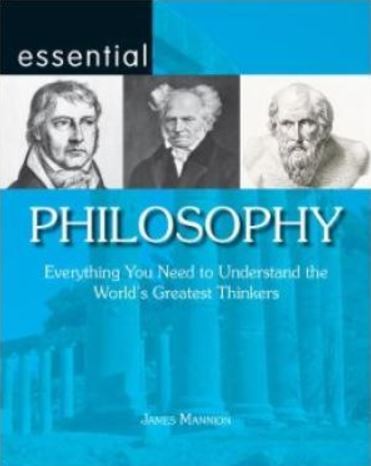★★★ Sign up to the Weekly Book Summary Newsletter by CLICKING HERE
★★★ Get any FREE audiobook of your choice by CLICKING HERE
- Everything is in a flux. There is no constancy in the universe. (Heraclitus)
- The more things change, the more they remain the same.
- There is a spiritual principle that something that was freely given to you should not then be imparted to someone else for a fee.
- Man is the measure of all things was the credo of Protagoras.
- When the student is ready, the teacher will appear.
- Socrates believed that truth did not lie in the natural world, nor was truth something that could be manipulated through verbal and intellectual trickery.
- While everyone has pretensions to insight and wisdom, they were as ignorant as he-more so because they thought they knew something. (Socrates)
- Being virtuous is its own reward; doing wrong is its own punishment. (Socrates)
- The unexamined life is not worth living. (Socrates)
- Know thyself. Wisdom comes not only from observation, but also through introspection. (Socrates)
- The unexamined life is not worth living. Doing what is right is the only path to goodness, and introspection and self-awareness are the ways to learn what is right. (Socrates)
- Philosophers will continue to philosophize.
- Plato was Socrates’ most famous protégé.
- They are more likely to kill the prophet, because he is a threat to the status quo.
- Knowledge is a fourfold, according to Plato. The knowledge from imagination, dreams, and what was later called the unconscious. Our perceptions of the outside world. Mathematical knowledge. Philosophical knowledge, which was big picture knowledge, an awareness of absolutes, universal truths in the form of those elusive forms.
- Love and death are the gifts given to us. Mostly they are passed on unopened. (Rainer Maria Rilke)
- While perception may be reality, things are perceived differently by different people. (Plato)
- This never-ending quest to reclaim that lost knowledge is what makes potential philosophers of us all. (Plato)
- The world of the senses, and of sensual pleasure, actually inhibits finding true happiness, because it makes us more grounded in the real world, which is, according to Plato, not the highest reality. (Plato)
- The theory of potentiality: Potentiality means that within everything, people included, these exists a natural evolution toward fulfilling its own potential, in essence becoming its own form. A movement in nature in nature and in humans from imperfection to perfection, or as close as anything can get to perfection. This is a hardwired component in all things that is an involuntary process, according to Aristotle.
- Aristotle speaks of causes in the process from potentiality to actuality and identifies four. The material cause means that an external force is creating or initiating the new thing. The efficient cause is the process of creation. The formal cause is that certain something in its natural state. The final cause is what it can become when it fulfills its potential.
- There is no pain in nothingness, and when you’re dead, you’re dead. You will not be aware of it because you will no longer exist, so there is no reason to fear death.
- Pleasure was defined as moderation, reading, and introspection, not the sensual indulgences that the word implies today.
- Epicurus believes that desires could be divided into the following categories: Natural desires that are essential and mandatory for survival (food and shelter). Natural desires that you can live without (sex). Narcissistic desire (wealth and fame) that should be avoided.
- The natural desires and relatively easy to satisfy, and the vain desires are difficult to achieve and indicative of a shallow personality. The vain desires should be expunged from you character because they are an obstacle to true inner peace.
- If we can live in the now and achieve tranquility one day at a time, then we are in the best possible “space”, and the elusive yet eminently desirable ataraxia (inner peace) will be ours
- The mind is a tabula rasa, or blank state, upon which experiences are imprinted. And because all knowledge is subjective, so is truth.
- Everything happens for the best, and you can usually expect the worst was the Stoic philosophy.
- Doing your best is its own reward.
- When you eliminate the impossible, whatever remains, however improbable, must be the truth.
- Christianity is a theology that professes a dogma. Dogma is a doctrine of belief presented as absolute truth in an authoritarian manner.
- Learn everything a noble and open-minded goal.
- As is always the case, once a thing becomes institutionalized, it becomes stale and rigid over time.
- Yesterday is history, and tomorrow is a mystery, the old adage tells us.
- Personal responsibility still rules in the human condition.
- Augustine espoused that evil is not a diabolical force ravaging the souls of the sinful, but rather the absence of good.
- Just as goodness is its own reward, sin is its own punishment.
- Famous maxim of Anselm was “Credo ut intelligam” which means I believe that I may understand.
- Three ways to gain knowledge: authority, reason, and experience.
- Ockham’s Razor, simply put, is the belief that when all things are considered, the simplest explanation is the truest one.
- Nicholas of Cusa employed a paradox that he called learned ignorance.
- There were unseen elements and untapped energies governing the cosmos that, if comprehended and perhaps even harnessed, could have world-transforming results.
- Bruno’s statement that someone who fancies himself a philosopher must be ready to doubt everything.
- The end justifies the means. (Machiavelli)
- Humanism is the belief in, and celebration of, the potential and abilities of man, without dependence on divine intervention to solve our problems.
- Mr Spock’s favorite axiom “The needs of the many outweigh the needs of the few, or the one.
- Bacon proposed that, in order to truly understand the world, we must first be aware of the various obstacles and distractions that prevent us from seeing things clearly. He identified these impediments as Idols. Idols of the tribe refers to the sense of self-importance that people have about their place the grand design of things and their penchant to take at face value the observations of our sense. In other words, everything may not be what it appears to be, and we should be aware of that.
- Never assume anything.
- Everything could be questioned, but one thing remained a fact: the thinking of the thinker. Self-awareness. You can count on at least one thing in this wacky world, according to Descartes: Wherever you go, there you are.
- Thinking substances are our mind, and extended substances are our physical bodies.
- The modus operandi of mankind was rooted in selfishness.
- Life was all about survival of the selfish and achievement at the expense of your neighbors.
- Capitalism of course is the system of providing goods and services for a financial profit.
- Berkeley made the distinction direct perception and indirect perception. Direct perception is the sensory input of things, and indirect perception is how they are interpreted by the mind.
- Buddhist philosophy-everyone should simply tend to their own garden, and the world will be a better place.
- Man was born free, yet everywhere he is in chains. (Rousseasu)
- Little ones, still in their natural and uncorrupted state, should have their spontaneous natures encourages, not thwarted.
- Perception is your reality.
- Hegel believed that reality was an Absolute Spirit and that history moved forward through constant acts of synthesis. Thesis meets its opposite, antithesis, and they combine into a synthesis, which then meets its own antithesis to make a new synthesis and so on and so on.
- Evolution of mankind as an orderly and rational process and the history of man as an evolution of greater and greater freedom.
- We all have physical bodies that are driven and motivated by will. Will is reality, according to Schopenhauer.
- Schopenhauer concludes that life is full of inherent misery. Life is pain will inspires desire, and desire is a constant reminder of the things in life that we lack.
- The more you know, the more it hurts is Schopenhauer’s pessimistic and depressing worldview.
- He was advocating mastering yourself and achieving your personal potential without allowing yourself to be inhibited by a repressive society.
- Nietzsche who uttered the famous aphorism “That which does not kill us makes us stronger.”
- Church and society successfully use guilt as a weapon and means to control people.
- Humans seek the pursuit of pleasure and the avoidance of pain.
- Passive resistance means that you will turn the other cheek to the law enforcement officials in riot gear and that you will do the time if you do the crime. The theory is that if enough people do this, then they will cause a change in society.
- Phenomenology also shows us how much our perceptions influence our worldwide. Perception is reality, as it were.
- We must think for ourselves and be suspicious neighbors of society think. We must decide things for ourselves and then have the integrity to stand up for our beliefs despite the inevitable pressure that will be applied by the group.
- With freedom comes fear.
- Objective truth implies means that what is true for you may not be true for your neighbor.
- Your life is like Master’s thesis, your life is your magnum opus.
- The only thing we really can be sure of is our being, our existence.
- Heidegger also believed that “being” is not a stagnant state. Existence is constantly changing.
- He felt that this hopelessness and despair and sense of the meaningless of life was a relatively new mindset brought about by the Industrial Age that was turning humanity into a race of lemming-like automatons.
- People had to take personal responsibility for their own action, not to waste time blaming society or god (whom they did not believe in) for their problems.
- Given a choice, most people, then and now, would rather read a novel or see a play than slog through a philosophical tome.
- For the most part, the person doing the othering considers themselves normal and the other person to be abnormal. But always be aware that someone else is over there othering you.
- Logocentric means hat philosophers see their writing as superior to other forms of writing, including fiction, poetry, or other manners of linguistic expression.
- Conflict between the classes was inevitability, due to the chasm between the haves and have-nots. This is called the Social Conflict theory.
- Population of passive sheep, and this passivity was exploited by the ruling class to further their capitalist goals and keep the masses docile, yet of service.
- Inherent inequality in capitalism.
- He proposed that cultures have a collective consciousness. The values and beliefs held by a culture direct the behavior of its members without their even knowing it.
- Adler believe that feelings of inferiority rather than sexuality were the main motivating unconscious force in people.
- The first noble truth is that life is inherently sad and full of suffering. Birth is a painful process and so is death, and in between is affliction, heartbreak, the death of loved ones, and your own inexorable trot toward your inevitable demise.
- The second Noble truth explains why we suffer. If is because people are unenlightened and unaware of the true nature of the universe. This and our obsession with earthly desires and material things add to life’s endemic melancholy.
- The third Noble truth is an optimistic one. You can transcend your earthly woes by shaking off the shackle of materialism and other sensual indulgences and seek enlightenment. Meditation is the path for most Buddhists.
- The fourth and final truth is that by following the Eightfold Path of Enlightenment, you can find the bliss that we all seek. The Eightfold Path is as follows:
- Right Understanding is awareness of the four noble truths and seeing yourself and life as it really is.
- Right Thoughts involve renouncing earthly pleasures, keeping positive thoughts, avoiding negative emotions, and maintaining peaceful, nonhostile thoughts.
- Right Speech means not lying, verbally attacking, maliciously gossiping, and so on.
- Right Action means not committing murder or other wrongs and exercising self-control in all your affairs.
- Right Livelihood, now taught as a New Age school of thought, teaches ethics in the workplace; in ancient times, it was more specific. Right Livelihood said the following businesses and practices should be avoided: munitions; livestock slaughterhouses; the slave trade; wine, spirits, and other mood-altering substances; and poisons.
- Right Effort entails avoiding evil in the world, not contributing to generating new evil, encouraging the good that already exist, and promoting new goodness. The old cliché that nothing is achieved without effort is no mere bromide. It is a universal truth. If you want something badly you have to work at it, and if that something is Enlightenment, the effort required is great indeed.
- Right Mindfulness means to maintain awareness at all time-awareness of your body, your feelings, your mind, and your thoughts.
- Right Meditation involves learning to meditate in order to achieve peace at the center and follow the path to Enlightenment.
- Zen suggest that you strive to see the world exactly as it is without clouding reality with your preconceptions.
- Zen Buddhism emphasize mediation as the path to discover your own “Buddha nature” and thus the keys to an Awakening.
- Be still and know is a popular Buddhist axiom. Listen to your heart would be another way of describing it.
- Through meditation and other forms of quiet time we can access the Tao. In the unhealthy hustle of the maddening rat race, the Tao cannot be intuited.
- Anger clouds the judgment of the adversary.
- I ching, means “Book of Changes.
- Amazing things that the human body can do when the mind is focused, intense, and driven.
- It is a basic thought that if people focused on the things that united them rather than the differences that divided them, the world would be a better place.
- Faith is a beautiful thing, and so is tolerance.
- Your own self-interest and your own happiness are the purest pursuits.
- Force is only to be used in self-defense.
- Job that suits you perfectly-a job where you feel fulfilled.
- Are you following your bliss?
- Turn repetitive motion syndrome into repetitive motion enlightment. Whistle while you work and find inner peace.
- There is a spirit world the coexists with the realm of physical reality.
- A human is one organism, and disease of the soul can become a diseased body.
- The African belief is that time is simply the life process.
- The Buddha exhorted people not to dwell on the past of brood about the future. The wise man focused on the now. A sense of mindfulness, awareness of the present moment without being assaulted by distractions from past you can’t change and a future that remains a mystery, is a great way to stay focused and sane.
- Serenity Prayer of St. Francis of Assisi as a meditation to reflect upon: God grant me the serenity to accept the things I cannot change, the courage to change the things I can, and the wisdom to know the difference.
- A smile is born on my lips.
- Socrates, as you recall, never made a dime off his philosophizing and thought it was inappropriate to do so. Wisdom should be freely available to all who seek it.
- Providing creature comforts and mindless entertainment.
- Life imitated art.
- Questions are a burden for others: Answers a prison for oneself.
- Alfred believed that feelings of inferiority rather than sexuality were the main motivating unconsciousness force in people.
- Society, in essence, took on a personality of its own.
- Cultures have a collective consciousness, where the values and beliefs held by a culture direct the behavior of its member without them even knowing it. (Emile Durkheim)
- Everything is in flux.
- Relativism is the belief that what is good for the goose may not be good for the gander.
- The only path to peace is to suspend judgment, because no worldwide is any better than another.
- He believed that people’s behavior could be changed through the process of conditioning.
To buy the book, click the link in the image below to purchase from Amazon.















